The Ultimate Guide to Finding the Best Dog Food for Golden Retrievers

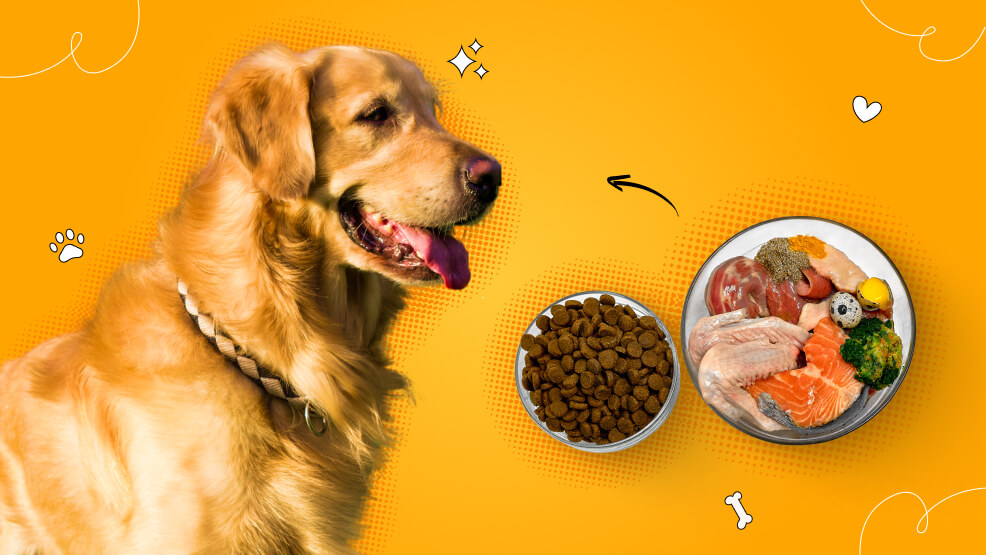
As a proud Golden Retriever owner, I can attest to the boundless energy and unwavering loyalty these remarkable canines bring into our lives. With their affectionate nature and gentle dispositions, Golden Retrievers have rightfully earned their place as one of the most beloved dog breeds worldwide. However, ensuring their optimal health and well-being requires a deep understanding of their unique dietary requirements.
In this comprehensive guide, we’ll uncover the secrets of providing the best dog food for our beloved Golden Retrievers. From decoding their nutritional needs to exploring top-quality brands and products, we’ll leave no stone unturned in our quest to nourish these furry companions with the utmost care and attention they deserve.
Understanding the Nutritional Requirements of Golden Retrievers
To truly comprehend the dietary needs of our Golden Retrievers, we must first understand their unique physiological makeup. As active and energetic dogs, Golden Retrievers require a diet rich in high-quality proteins and essential nutrients to support their muscular development and overall vitality.
Here are some key nutritional requirements to consider:
- Protein: Golden Retrievers thrive on a diet high in animal-based proteins, such as chicken, turkey, or fish. Adequate protein intake is crucial for maintaining lean muscle mass, supporting growth, and promoting a healthy immune system.
- Fats: While often overlooked, healthy fats play a vital role in providing energy, promoting skin and coat health, and facilitating the absorption of fat-soluble vitamins. Look for dog foods that contain omega-3 and omega-6 fatty acids from sources like fish oil or flaxseed.
- Carbohydrates: Complex carbohydrates derived from whole grains, vegetables, and fruits provide essential fiber and energy for your Golden Retriever. However, it’s important to strike a balance and avoid excessive carbohydrates, which can lead to weight gain and potential health issues.
- Vitamins and Minerals: A well-rounded diet should include a variety of vitamins and minerals, such as calcium, phosphorus, vitamin A, and vitamin E, to support strong bones, a robust immune system, and overall health.
By understanding these fundamental nutritional requirements, you’ll be better equipped to evaluate and select the best dog food that meets your Golden Retriever’s specific needs.
Common Health Issues in Golden Retrievers Related to Diet
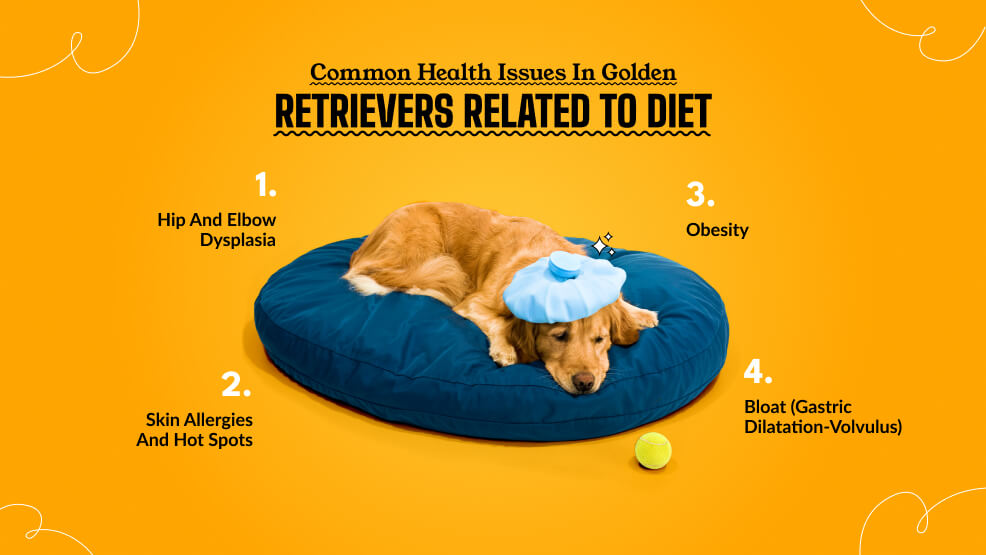
While Golden Retrievers are generally known for their robust health, certain dietary factors can contribute to the development of various health issues. Being aware of these potential concerns can help you make informed decisions about your furry friend’s diet and take proactive measures to prevent or manage them.
Here are some common health issues in Golden Retrievers that may be influenced by diet:
Hip and Elbow Dysplasia
This genetic condition, which affects joint health, can be exacerbated by excessive weight gain or nutrient deficiencies. Maintaining a balanced diet and optimal body weight can help alleviate stress on the joints and reduce the severity of symptoms.
Skin Allergies and Hot Spots
Food allergies or sensitivities can trigger skin irritations, hot spots, and excessive scratching or licking. Identifying and eliminating potential allergens from your Golden Retriever’s diet may help alleviate these issues.
Obesity
Like many breeds, Golden Retrievers are prone to obesity if their caloric intake exceeds their energy expenditure. Obesity can lead to a host of health problems, including joint issues, respiratory difficulties, and an increased risk of diabetes.
Bloat (Gastric Dilatation-Volvulus)
This potentially life-threatening condition, where the stomach twists and fills with gas, is more common in deep-chested breeds like Golden Retrievers. Feeding smaller, more frequent meals and avoiding excessive exercise immediately after eating can help reduce the risk of bloating.
By being mindful of these potential health concerns and tailoring your Golden Retriever’s diet accordingly, you can proactively address or prevent many diet-related issues, ensuring a happier and healthier life for your furry companion.
Factors to Consider When Choosing the Best Dog Food for Golden Retrievers
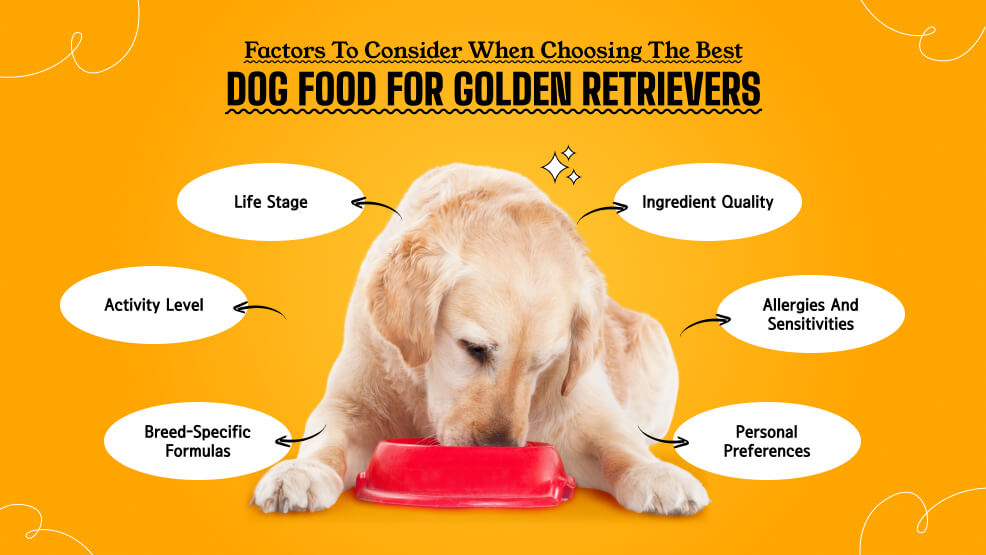
With countless dog food options available on the market, selecting the right one for your Golden Retriever can be a daunting task. However, by considering the following factors, you can make an informed decision that aligns with your furry friend’s specific needs and preferences.
Life Stage
A Golden Retriever’s nutritional requirements vary throughout their life stages, from puppyhood to adulthood and senior years. Look for dog foods specifically formulated for each life stage to ensure your pup receives the appropriate balance of nutrients.
Activity Level
Active and energetic breeds like Golden Retrievers require a diet that provides sufficient calories and nutrients to fuel their daily exercise and playtime. If your furry companion is particularly active, consider high-energy dog food or consult with your veterinarian for personalized recommendations.
Breed-Specific Formulas
Some dog food brands offer breed-specific formulas tailored to the unique needs of Golden Retrievers. These formulas take into account their size, energy levels, and potential health concerns, providing a well-rounded nutritional profile.
Ingredient Quality
Not all dog foods are created equal. Opt for high-quality, nutrient-dense ingredients sourced from reputable suppliers. Avoid dog foods with excessive fillers, artificial preservatives, or low-quality protein sources.
Allergies and Sensitivities
If your Golden Retriever has known food allergies or sensitivities, carefully review the ingredient list and choose a dog food that excludes potential allergens, such as specific proteins, grains, or dairy products.
Personal Preferences
While nutritional value should be the primary consideration, don’t overlook your Golden Retriever’s personal preferences. Some dogs may prefer certain textures, flavors, or shapes, which can influence their overall enjoyment and willingness to consume the food.
By carefully evaluating these factors, you can narrow down your options and select a dog food that not only meets your Golden Retriever’s nutritional requirements but also aligns with their individual needs and preferences.
Key Ingredients to Look for in Golden Retriever Dog Food
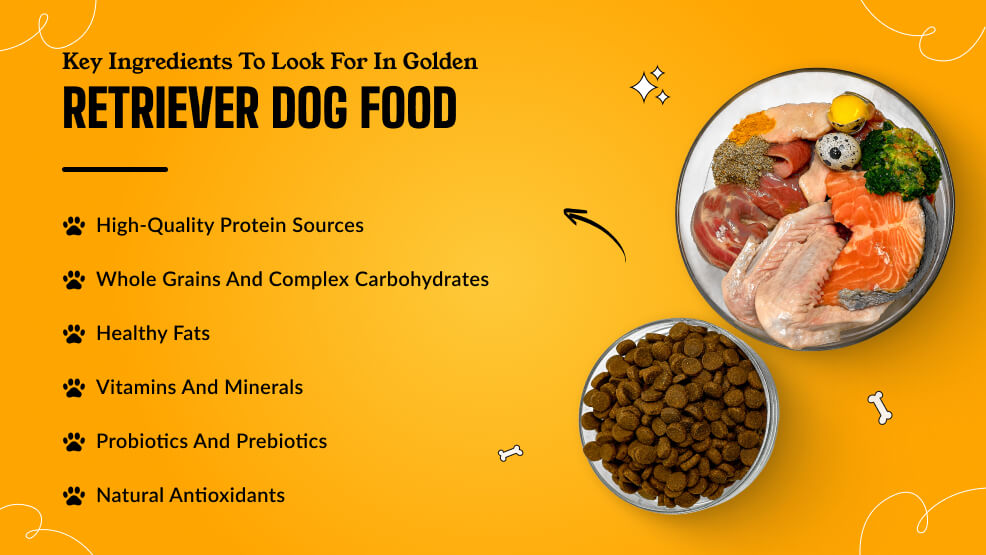
When it comes to selecting the best dog food for your Golden Retriever, understanding the key ingredients to look for can make a significant difference in their overall health and well-being. Here are some essential ingredients to prioritize:
High-Quality Protein Sources
Look for dog foods that list animal-based proteins, such as chicken, turkey, or fish, as the first or second ingredient. These protein sources provide essential amino acids for muscle development, growth, and overall health.
Whole Grains and Complex Carbohydrates
Opt for dog foods that contain whole grains like brown rice, oats, or quinoa, as well as complex carbohydrates from vegetables and fruits. These ingredients provide fiber, energy, and essential nutrients for your Golden Retriever.
Healthy Fats
Seek out dog foods that include sources of omega-3 and omega-6 fatty acids, such as fish oil, flaxseed, or canola oil. These healthy fats contribute to coat and skin health, support cognitive function, and promote overall well-being.
Vitamins and Minerals
Ensure dog food contains a balanced blend of essential vitamins and minerals, including vitamins A, B, C, D, E, and K, as well as calcium, phosphorus, and zinc. These micronutrients support various bodily functions and contribute to overall health.
Probiotics and Prebiotics
Some dog foods incorporate probiotics (live beneficial bacteria) and prebiotics (dietary fibers that feed the probiotics) to support digestive health and a balanced gut microbiome. Using both probiotics and prebiotics together can maximize their benefits, ensuring a healthy gut environment and overall improved health for your dog.
Natural Antioxidants
Look for dog foods that contain natural antioxidants like vitamins C and E, as well as plant-based compounds like rosemary extract or turmeric. These antioxidants help combat free radicals and promote overall well-being.
By prioritizing these key ingredients, you can ensure your Golden Retriever receives a well-balanced and nutrient-dense diet tailored to their specific needs, supporting their growth, energy levels, and overall health.
When selecting a brand and product, it’s essential to carefully review the ingredient list, nutritional analysis, and any breed-specific recommendations. Additionally, consulting with your veterinarian can provide valuable insights and help you make an informed decision tailored to your Golden Retriever’s unique needs.
Tips for Feeding Your Golden Retriever for Optimal Health
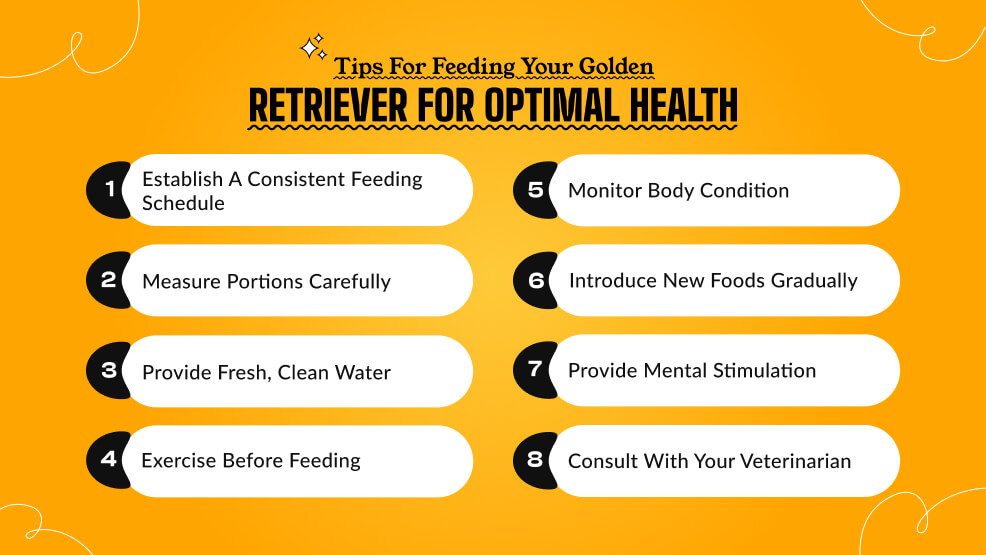
Proper feeding practices play a crucial role in maintaining your Golden Retriever’s overall health and well-being. Here are some valuable tips to ensure you’re nourishing your furry companion in the best possible way:
Establish a Consistent Feeding Schedule
Golden Retrievers thrive on routine, so aim to feed your pup at the same times each day. This helps regulate their metabolism, aids in digestion, and prevents begging or overeating.
Measure Portions Carefully
Follow the recommended serving sizes on the dog food packaging and adjust as needed based on your Golden Retriever’s age, activity level, and body condition. Overfeeding can lead to obesity and related health issues.
Provide Fresh, Clean Water
Ensure your Golden Retriever has access to fresh, clean water at all times. Proper hydration is essential for overall health and can aid in digestion.
Exercise Before Feeding
Engaging your Golden Retriever in physical activity before mealtime can help stimulate their appetite and improve digestion. However, avoid strenuous exercise immediately after eating to prevent bloating.
Monitor Body Condition
Regularly assess your Golden Retriever’s body condition by feeling their ribs and observing their waistline. Adjust their food portions accordingly to maintain a healthy weight and body condition.
Introduce New Foods Gradually
When transitioning to a new dog food or introducing new treats or supplements, do so gradually to allow your Golden Retriever’s digestive system to adjust and prevent potential upset.
Provide Mental Stimulation
Engage your Golden Retriever in interactive feeding activities, such as puzzle feeders or food-dispensing toys, to promote mental stimulation and prevent rapid consumption.
Consult with Your Veterinarian
Regular check-ups with your veterinarian can help identify any potential dietary concerns or adjustments needed based on your Golden Retriever’s age, health status, or specific needs.
By following these tips, you’ll not only ensure your Golden Retriever receives the proper nutrition but also promote a healthy relationship with food and encourage overall well-being.
Remember, the path to optimal health and happiness for your Golden Retriever starts with a well-balanced and tailored diet. By making informed choices and following the tips and guidelines outlined in this guide, you’ll be setting your furry companion up for a lifetime of energy and good health.






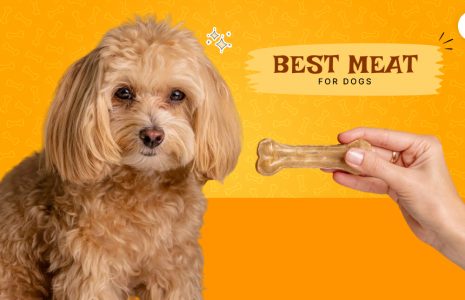
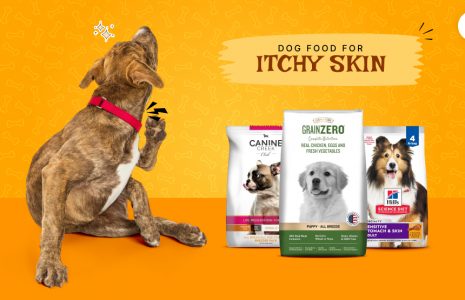
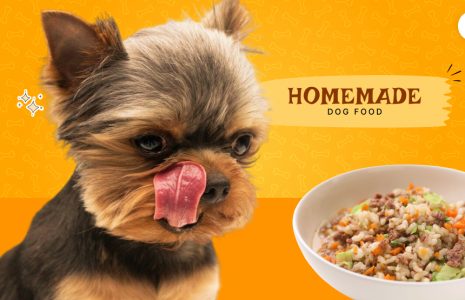
Leave A Comment